Last Updated on December 16, 2024 by Ellen
Slow travel on a budget sometimes means there are issues to deal with. Since 2015, we’ve learned how to travel cheap and handle problems we didn’t anticipate in our ‘normal’ American lifestyle.
We wouldn’t change our early retirement decision, and budget slow travel is a dream come true. Yet there are lifestyle issues that commonly arise. I’ll be honest in this article and talk about some unpleasant realities. The good news is they all can be overcome easily enough with some patience and planning.
How to travel cheap and handle problems
When we say “travel cheap” we are talking about a budget of about $2,000 a month for two people in developing countries (Philippines, Vietnam, Nepal, etc.), and $3,000 per month for both of us in developed nations (Korea, Japan, Romania, Turkiye, etc).
As our long-time readers know, budgets are relative. But we are determined to keep going for as little money as possible — without sacrificing comfort — as inflation touches all corners of Earth.
With that budget background for new readers, here are the top 10 challenges we find in our early retirement, budget slow travel adventure.
Cleanliness
Cheap travel doesn’t mean dirty travel.
We have found different levels of cleanliness in our rental units both before and after the pandemic. What we think is clean is far different from what some Airbnb hosts believe is clean. It’s not that they’re dirty either — but there are definitely cultural differences to how people live.
Sometimes, our cheaper apartments ($280 – $500) are cleaner than the more expensive ones!
Dust, unpleasant smells, a little hair, a stained sheet or towel is sometimes acceptable to an Airbnb host offering a budget-friendly pad. That’s not acceptable to us.
For example, we rented a one-bedroom apartment for a month in Bangkok. It was spacious, ideally located near public transportation in a trendy spot. It had good reviews, good amenities like a washer and a pool, fast WiFi and cable TV.
Yet, when we arrived, there was a layer of dust on everything. We had to clean it ourselves. That dust layer is common in Bangkok during the ‘burning’ season, and wasn’t thoroughly cleaned before our arrival.
How to solve the cleanliness problem
Airbnb disperses payment to the owner after the first 24 hours of your stay, in case something is wrong.
In our Bangkok example, Theo let the owner know there was something wrong. He offered to refund the cleaning fee, and we accepted the offer.
Related: Continuous Airbnb living as budget slow travelers
We carry a helpful travel cleaning kit. Rubber gloves, scrubbies, small hand towel, travel size liquid soap, anti-bacterial wipes. Yes – these things are available all over Earth, but maybe not when you arrive from a midnight ferry or flight and stores are closed.
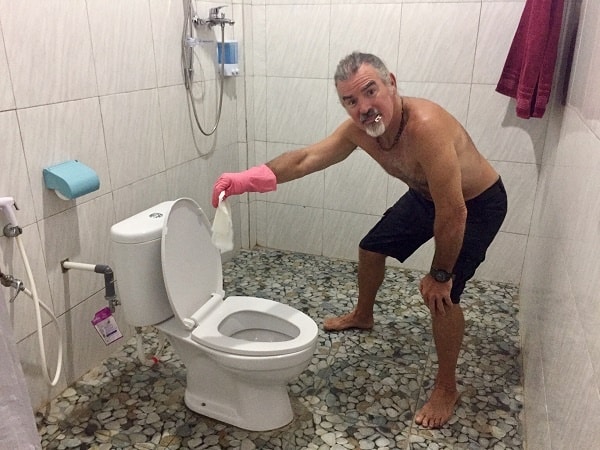
Utility issues
Even a beautiful, spotless place can have major problems with utility services in developing nations. Water and electric service can cut out – sometimes for hours, and sometimes (gulp) for an entire day! It’s happened to us many times because we travel in developing nations.
Power and water frequently went out in the Philippines – especially in mainland Malay in Aklan Province. It was so ridiculous – compared to American standards – that the power company would announce on Facebook when the electricity service would be interrupted for an entire day for service.
We also lost power – and water – now and then in Guatemala and Mexico. I have been in the shower, all soaped up, when the water stopped flowing. I’ve also planned a laundry day only to find the water is off.
How to handle the electricity problem
Follow the electric company or cooperative on social media. Not even kidding. That’s the only way I knew when an upcoming day-long outage would happen in a rural area of the Philippines. Long outages meant workers were trimming jungle foliage or system upgrades.
With advance notice, you will know to charge devices and skip the laundry that day.
Sometimes, there is no advance notice. That’s happened to us a lot, too. Storms happen. Accidents happen. If you’re staying a month in a rural place, or a developing place, get a small flashlight – or even a headlamp. We’ve had these, and they’ve save us.
How to handle the water problem
We once stayed with a Mayan family in Guatemala for several nights. They had no indoor plumbing. We learned from them how much of the world handles this issue: stack up buckets filled with water in advance of dishes, laundry, bathing, and enough for a day of flushing.
Drinking water is a separate thing. Most of the developing world doesn’t drink from the tap – they use giant jugs of filtered, treated water. We try to keep extra drinking water around, just in case deliveries are late. Because that too can happen.
Cheap travel nasties & noise
When bugs crawl out of drains… yes, that happens. Sometimes the septic system is so nasty the smell coming from drains will choke you to death.
Or when dogs bark night and day. And those times when roosters make such a racket you cannot hear yourself think!
How about this: you’re walking on a street or dirt path with chicken or goat or dog feces, or cow pies (India!) all around and then — a downpour! Everything gets mushy and runny and you can’t avoid stepping in nasty shit.
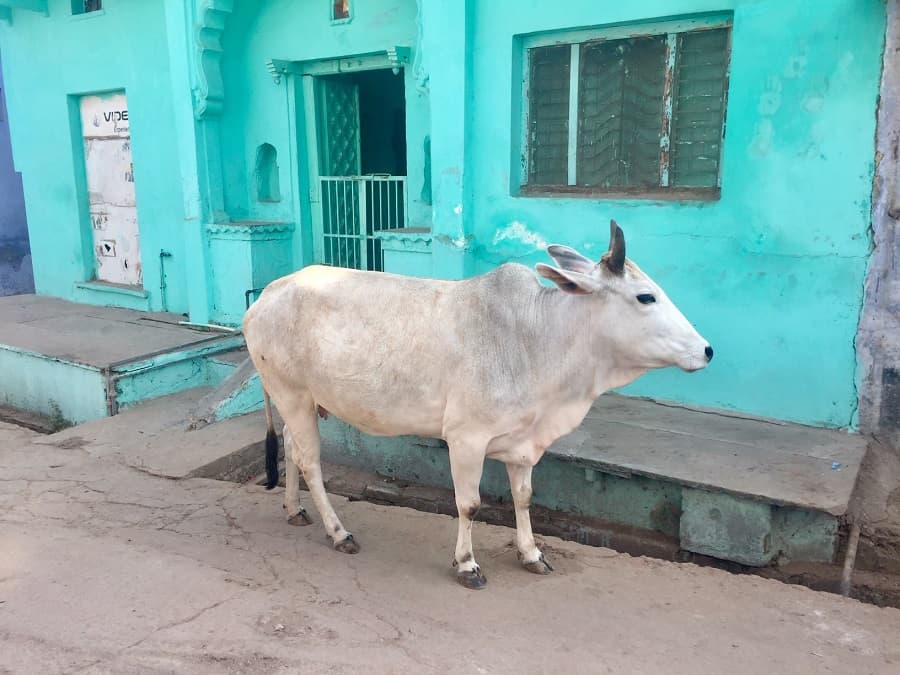
This all happens in developing areas — even places popular with expats and retirees. Places like Puerto Vallarta, or Tulum, Mexico, or Lake Atitlan, Guatemala, or Caye Caulker, Belize, or Fez, Morocco, or Chiang Mai, Thailand, Pondicherry, India (or anywhere in India), etc.
How to fix nasties and noises
Drain covers can be a godsend. Blocks the smells and the bugs. Don’t have one? Designate a dish. (Remember our travel cleaning kit? Part of our cleaning routine is to wash all dishes and utensils before we use them in rentals. Read that post for more information.)
Ear plugs might come in handy. Blocks the barking dogs and crowing roosters. Theo uses these, I don’t. I’m a heavier sleeper, thankfully.
Pollution problems
We all know trash is a problem. It’s especially horrific in some poorer areas of the world.
Something you might not realize: many places popular with expats and retirees are more polluted than most retirement articles will admit. Lake Atitlan, Pattaya, Thailand, all over India immediately come to mind.
There is also air pollution and other smelly assailants like urine, feces, rotting fruit, etc. Fact: many countries do not have, or they do not enforce, emissions standards.
Panama City, Cebu City, Philippines, and Bangkok, Thailand, are a few examples of where air pollution was awful at times when we visited.
How to handle the pollution problem
Be ready for less-than-thrilling sensory experiences.
A mask might help. If you aren’t into masks as protection against virus exposure, maybe the air pollution will make you want to wear one.
Years before COVID, we sometimes wore masks because of air pollution.
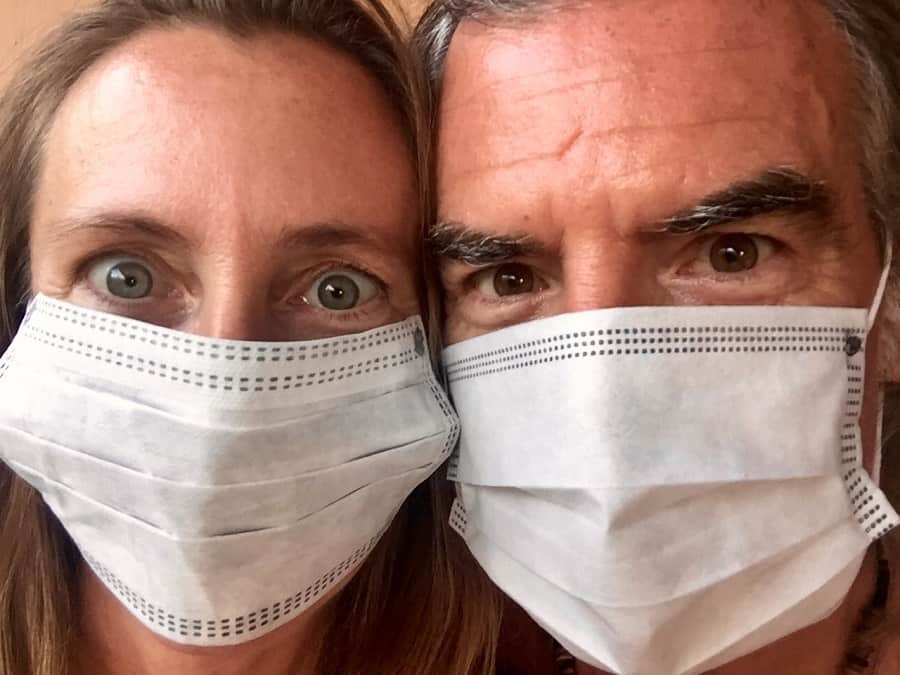
We reuse plastic as much as possible to reduce our trash heap much as possible.
That’s it. That’s all I got for handling such unpleasantries. Reduce, reuse and recycle, mask up.
Or, you could stay inside a manicured all-inclusive resort and avoid all those problems. But that’s not authentic budget slow travel, is it?
Incessant Vendors
Incessant vendors who approach you continuously to buy their wood carvings, wall art and other large nonsensical items can be annoying.
Worse, for me: the Western white guilt that goes with saying ‘no’. These vendors don’t understand that we white people aren’t going ‘home’ from a vacation, and we don’t mail things ‘home’. We are vagabonds – homeless by choice. That’s difficult to convey when there’s a language barrier.
How to handle the incessant vendor problem
A few polite ‘no thank yous’ in their language is usually enough. Just don’t be rude. Ever.
If it’s a trinket, a bracelet, a doll, something small, I will buy it to help the person make a buck. I then have to give it away, which is really no price to pay for helping someone out.
And, I try not to buy from kids, as tempting as it is. Parents will keep kids out of school if it will help their sales. It’s heartbreaking, I know.
We prefer to give ‘help’ to people we come to know and befriend through our slow travel, or give to local charities, or even Kiva.org – a micro-lending organization we have plugged many times before.
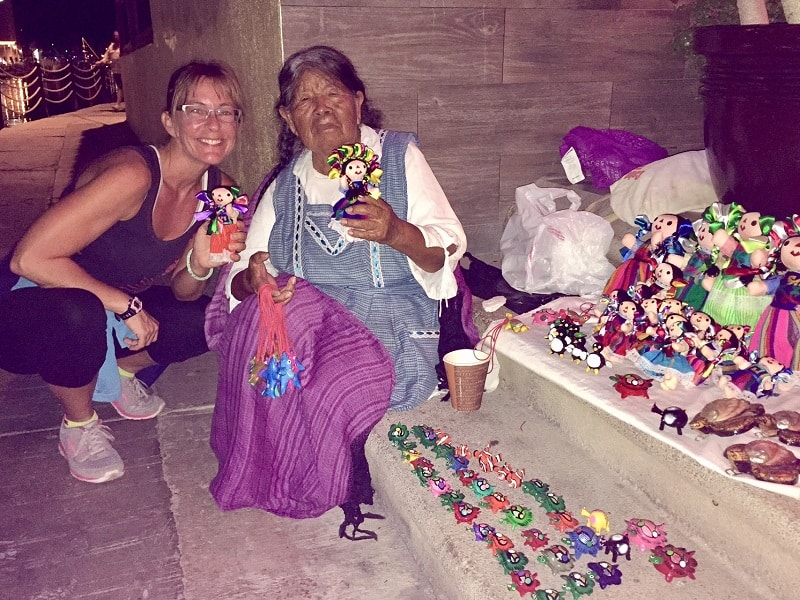
How to travel with cheap data
One key point on how to travel cheap is how to stay connected without spending a ton of money.
Most Americans don’t realize the big, popular American telecommunication companies charge outrageous amounts for data plans.
WiFi is the cheapest method. But sometimes you need to be more connected, like inside a store without a connection and you might need a translation app, as happened to us many times in Seoul, South Korea.
How to solve the connectivity problem
We buy SIM cards in most countries we visit. It’s usually data only, and if we need to make a call, we use an app like Whatsapp or Messenger, or our Talkatone app that gives us a U.S. number and can be used on WiFi (Talkatone details in another post).
Foreign SIMs save a lot of money. Examples: about a dollar a day in Taiwan in late 2024 for unlimited data and a few calls and texts if needed; $12 for two people (!) in India to have 40GB of data a month in late 2022; $9 in the Philippines for a month in late 2022; $12 a month in Thailand in mid-2022.
Our phones don’t support eSIMs but fellow traveling friends say they’re now more expensive that traditional plans. Of course, the benefit of an eSIM is arriving in a country at midnight at being able to be connected right away.
Whatever you do, make sure you get a prepaid plan — not a post-paid plan — or you might be on the hook for more than you bargained for.
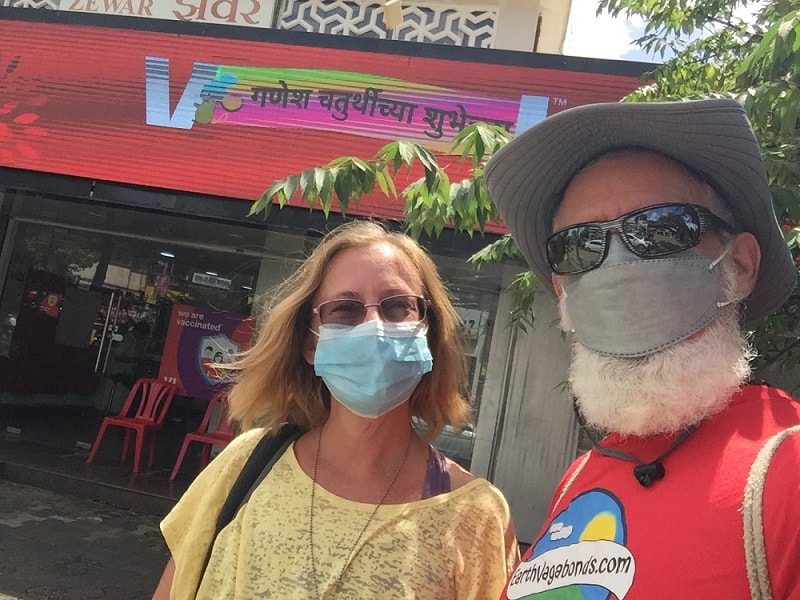
3 Extra tips on communication services
1: Rural areas in developing countries still have many dead zones. So even if we did travel with an international plan by an American company, we might not get a signal everywhere anyway!
2: In some countries, like Thailand and India, you have to show your passport to get the SIM card because the government wants to know what you’re up to.
3: Check for the exact time your data expires. It might expire at midnight on the the 28th day, instead of the time when you bought the card.
Transportation costs
If you want to travel cheap around the world, you have to forget about frequent flights. We aren’t exactly jet-setting into the sunset. Also, you can’t hop into your SUV parked in the garage.
Sometimes we ride on local “chicken buses”, like the one pictured below. For less than ten miles you pay a few cents. Not hundreds in car payments, gas and insurance.
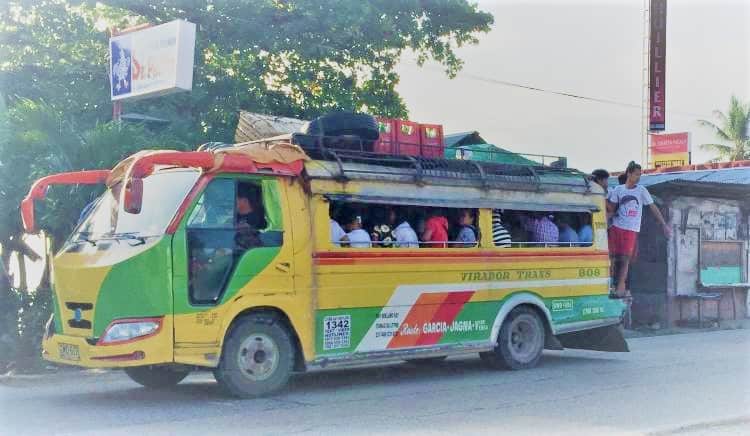
But don’t freak out – you can budget slow travel more comfortably than in a jeepney.
How to travel cheap with transport
We try to take regional buses, which are more modern and comfortable than the one pictured above. Prices vary by country and whether you’re going 50 miles, 200 miles or more. But be assured: it’s usually much cheaper than a flight.
Also, we ride trains (budget) for regional distances whenever possible (lessening the pollution problem), as we enjoy the journey (slow travel) since we don’t have to go back to work (early retirement).
Since we slow travel – that is, we stay in one location for a month or more – we buy used bicycles for local transport.
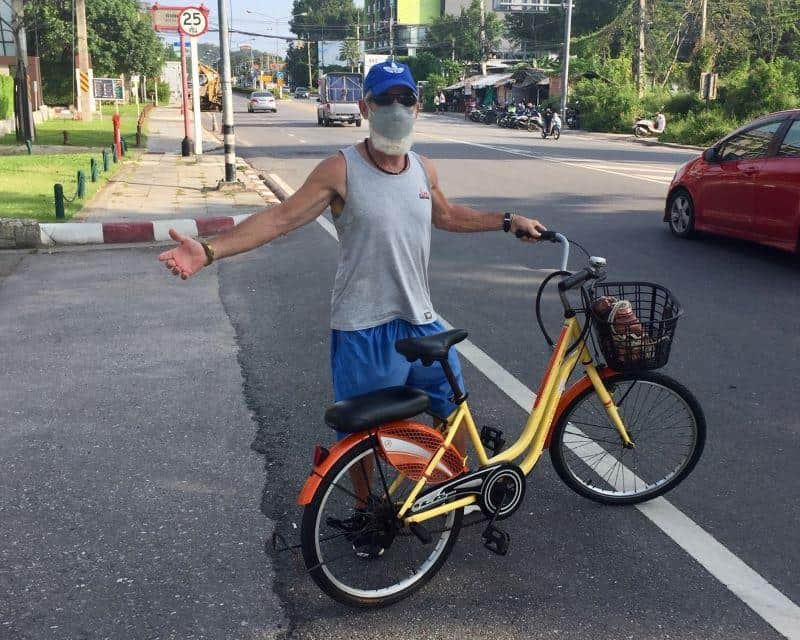
Not only do bicycles save money and prevent more pollution, but they’re great for exploring and exercise.
When we leave a location, we donate the bike.
We also walk a lot. Pack comfortable walking shoes and a hat. I prefer walking before the sun gets too high in tropical countries.
Public bathroom problem
When the bus pulls off at the rest stop in the Berber mountains of Morocco, you will likely find a primitive toilet unlike any you’ve used in the USA.
Doing your business in a homestay at Panama’s San Blas Islands might mean an outhouse that drops into the ocean. (Although we have read some of those island had to be evacuated in 2024 due to rising water.)
In much of the world, you cannot flush the toilet paper. Sometimes we’ve had to burn our own paper. (And yes, we have a post for that, too.)
Fact: public bathrooms sometimes have no seats, no paper, no soap, no water, and you had to pay five pesos for the honor.
How to solve the bathroom problem
Accept it. And try to do your business at ‘home’.
Long before the pandemic, I carried tissues and hand sanitizer. Indispensable!
I also discovered a helpful trick that works for squat toilets. You might get grossed out, but this is the real world. I wear knee-length skirts on travel days when possible. If I have to use the squat toilet at a bus stop, it’s easier for me stay clean and dry.
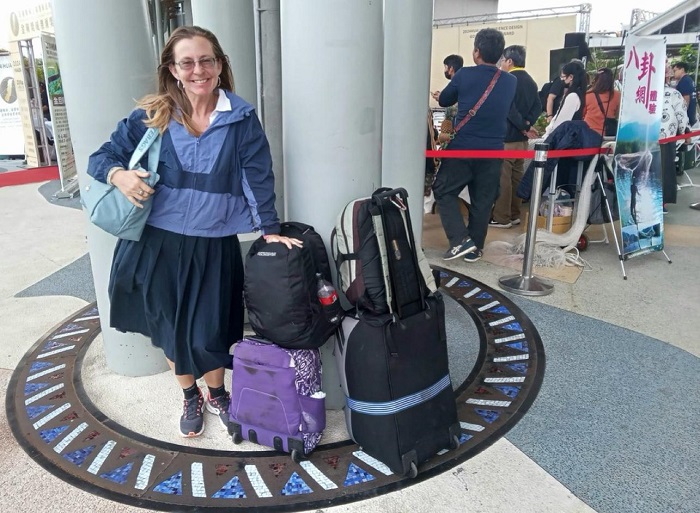
The problem of missing family
It’s great to take an extended trip — to budget slow travel the world in early retirement.
But at some point, you are going to severely miss your family – never mind mint chocolate chip ice cream.
How to solve the problem of missing family
You might think the answer is to go back and visit. Sure, that’s one answer.
But it’s not exactly how to travel cheap if you are always flying from one side of Earth to the other.
A better answer for traveling cheap might be to schedule a trip ‘home’ and slowly work your way back west, or north, etc. Move in the general direction of ‘home’ – doing slow travel on the way.
You might think another answer could be to call. Sure, that works. Somewhat. It’s never the same to see Brady Bunch boxes on a Zoom call with family as it is to sit down at a dining room table and revel in real time connection.
Acceptance is the answer. Before you set off on your adventure, accept you might not see your family for extended periods of time — and — your family might have zero interest in meeting you abroad.
When people ask for money
Beggars ask you for money, including while you are dining at a street side cafe they could never afford.
In developing nations, everyone from locals with an emergency, to people who walk up to your cab gesturing to their mouth, to a mother and child on the sidewalk, to a legless man on the beach, and on and on.

It also happens in developed countries. Ukranians who fled the war asked for help in Romania and Bulgaria. Taiwan and Korea have those left out of capitalism’s race.
It’s everywhere.
How to solve the beggar problem
The world is full of greed, corruption – selfishness. So there is no solution I can offer here.
We try to be as generous as we can. Oh – the stories we could tell! Most of the time, we try to help people who become friends – or we make donations to organizations where the money will be best utilized for longer-term solutions.
Our monthly budget breakdowns always have a charity/gift category, like this one from 2022, and this one from late 2024. We give varying amounts each month — we do what we can.
And we count our blessings at all times.
10 challenges on how to travel cheap: Solved!
I hope you enjoyed how we overcome these 10 challenges of how to travel cheap.
None of them will deter us from our dream lifestyle of budget slow travel in early retirement. These ‘problems’ make it all the more authentic, fun, real – and they make me grateful for all that I’ve been able to learn and experience.
So if you live vicariously through us, or if you want to join us out here, remember: it’s not always a picture-perfect journey, but it’s definitely a thrilling adventure!
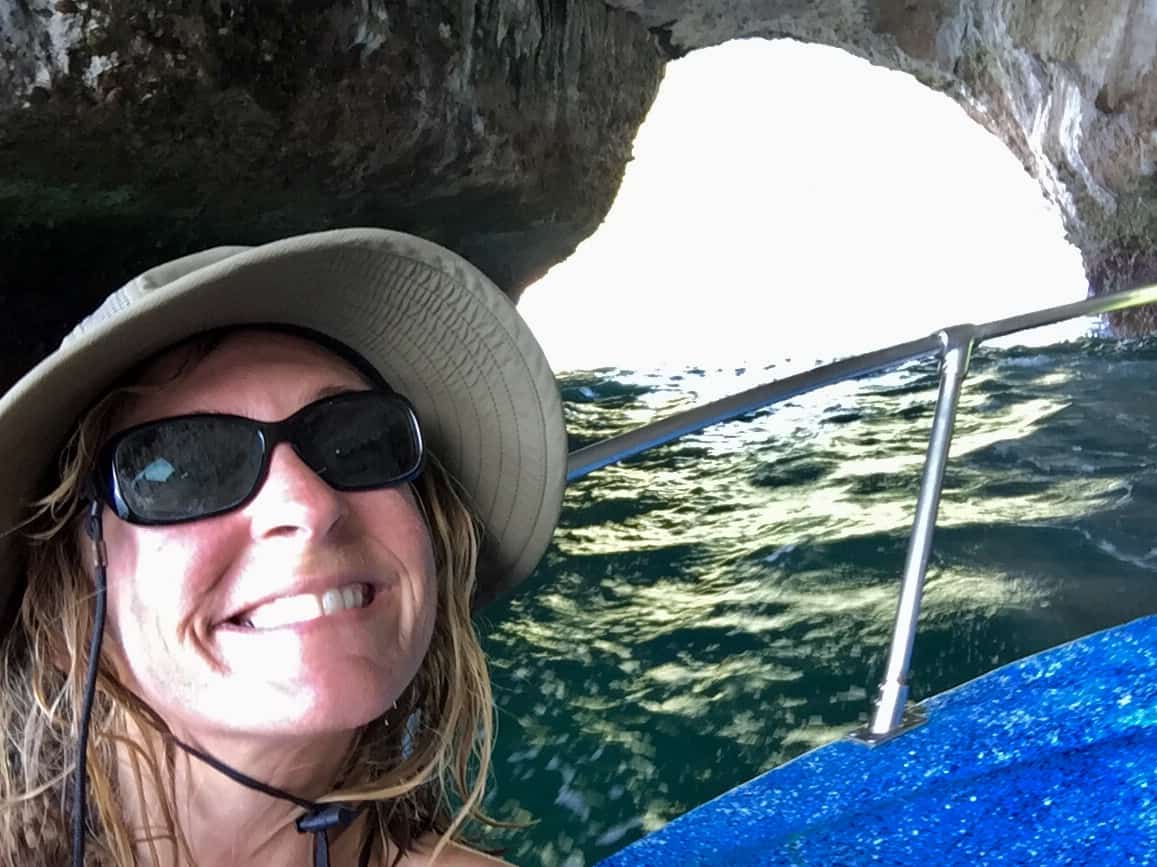
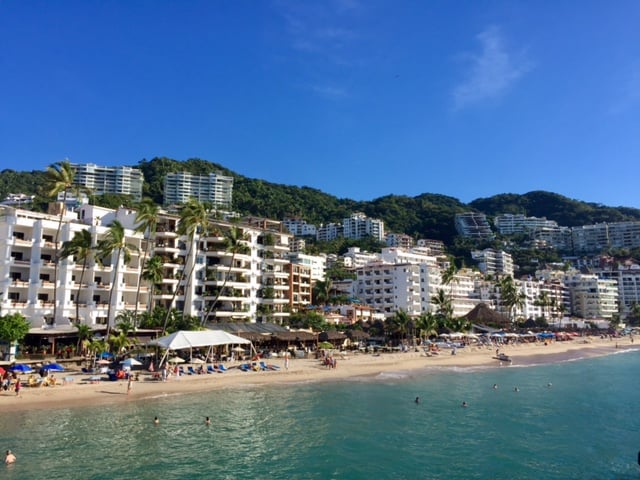
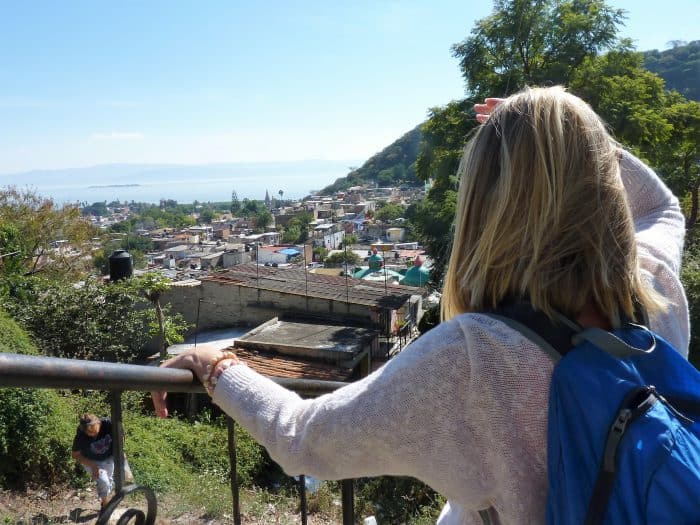
This article was originally posted December 2016, revised in 2018 and 2022, and last updated December 2024.
Thanks for reading, “How to travel cheap and handle problems.”
Other articles you might like:
- Health care guide for budget slow travelers
- What it cost to live in Taipei 1 month in 2024
- 10 unusual things on our pack list
- Ten Tokyo surprises
- Best travel way to make brewed coffee
vagabond
Vagabond: (n) A person who wanders from place to place without a home or job. (adj) Having no settled home.
slow travel
Long-term stays; use buses and trains with infrequent flights; the faster you go the less you see.

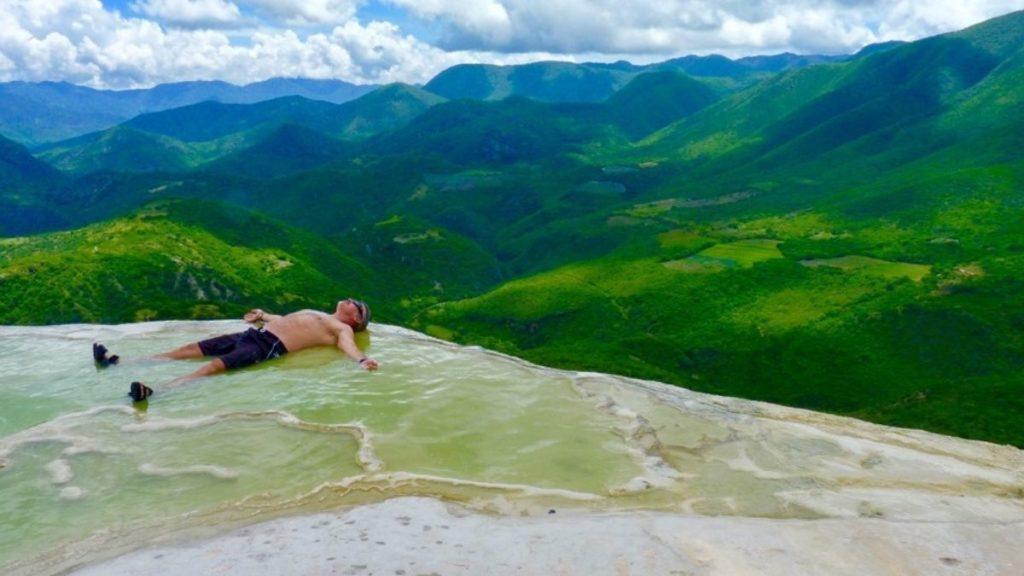
yep! been there done that…..all of it! and keep goin back for more ?